Related Research Articles

The Society of Jesus, also known as the Jesuit Order or the Jesuits, is a religious order of clerics regular of pontifical right for men in the Catholic Church headquartered in Rome. It was founded in 1540 by Ignatius of Loyola and six companions, with the approval of Pope Paul III. Today, the Society of Jesus is engaged in evangelization and apostolic ministry in 112 countries. Jesuits work in education, research, and cultural pursuits. Jesuits also conduct retreats, minister in hospitals and parishes, sponsor direct social and humanitarian works, and promote ecumenical dialogue.

Pope Clement XIV, born Giovanni Vincenzo Antonio Ganganelli, was head of the Catholic Church and ruler of the Papal States from 19 May 1769 to his death in September 1774. At the time of his election, he was the only Franciscan friar in the College of Cardinals, having been a member of OFM Conventual. He is the most recent pope to take the pontifical name of "Clement" upon his election.
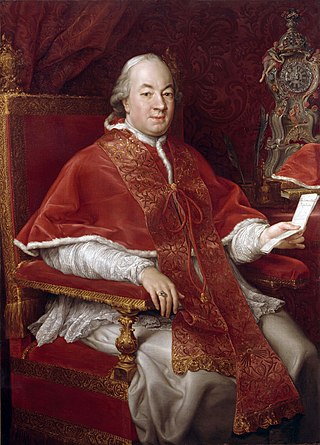
Pope Pius VI was head of the Catholic Church and ruler of the Papal States from 15 February 1775 to his death in August 1799.
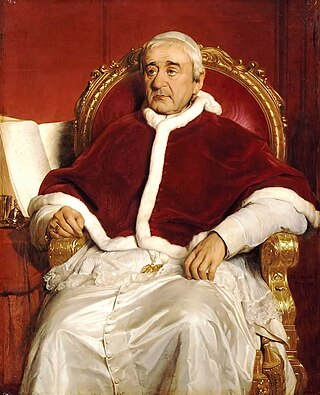
Pope Gregory XVI was head of the Catholic Church and ruler of the Papal States from 2 February 1831 to his death in June 1846. He had adopted the name Mauro upon entering the religious order of the Camaldolese.

Pope Pius VII was head of the Catholic Church from 14 March 1800 to his death in August 1823. He ruled the Papal States from June 1800 to 17 May 1809 and again from 1814 to his death. Chiaramonti was also a monk of the Order of Saint Benedict in addition to being a well-known theologian and bishop.

The suppression of the Society of Jesus was the removal of all members of the Jesuits from most of Western Europe and their respective colonies beginning in 1759 along with the abolition of the order by the Holy See in 1773; the papacy acceded to anti-Jesuit demands without much resistance. The Jesuits were serially expelled from the Portuguese Empire (1759), France (1764), the Two Sicilies, Malta, Parma, the Spanish Empire (1767) and in Austria and Hungary (1782).

The superior general of the Society of Jesus is the leader of the Society of Jesus, the Catholic religious order also known as the Jesuits. He is generally addressed as Father General. The position sometimes carries the nickname of the Black Pope, because of his responsibility for the largest male religious order, in contrast with the white garb of the pope. The thirty-first and current superior general is Fr Arturo Sosa, elected by the 36th General Congregation on 14 October 2016.

Jan Philipp Roothaan, SJ was a Dutch Jesuit, elected twenty-first Superior-General of the Society of Jesus. Roothaan was a decisive figure in the reestablishment of the order after the Suppression of the Society of Jesus. He authorized the 1838 Jesuit slave sale, which saw over 200 enslaved people sold.
The Secretariat of State is the oldest dicastery in the Roman Curia, the central papal governing bureaucracy of the Catholic Church. It is headed by the Cardinal Secretary of State and performs all the political and diplomatic functions of the Holy See. The Secretariat is divided into three sections: the Section for General Affairs, the Section for Relations with States, and, since 2017, the Section for Diplomatic Staff.

Luigi Fortis was an Italian Jesuit elected the twentieth Superior-General of the Society of Jesus.
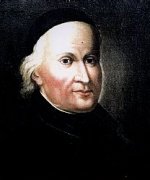
Tadeusz Brzozowski, SJ was a Polish scholar, teacher, administrator and a Jesuit priest. Having secured its continuity during the suppression of the Society until its restoration, he was elected twentieth Superior General of the Society of Jesus and was its first world-wide general.
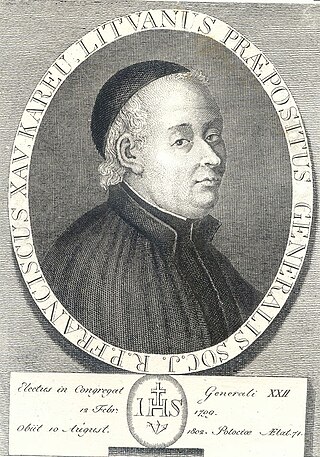
Franciszek Kareu, SJ was a Polish-Welsh Jesuit priest, architect, missionary and teacher in the region of modern day Belarus. During the worldwide suppression of the Society of Jesus, with the exception of the territory of the Russian Empire, he was elected temporary vicar general of the Society of Jesus in Russia from 1799 to 1801. His careful management of this precarious institutional challenge facilitated a transition leading to the universal restoration of the order in the early 19th-century.

Joseph Mary Pignatelli, SJ was a Spanish priest who was the unofficial leader of the Jesuits in exile in Sardinia, after the suppression of the Society. Supervising its restoration, he is considered the second founder of the Society of Jesus.
Alfonso Muzzarelli was an Italian Jesuit theologian and scholar.
Apostolicum pascendi was a papal bull issued by Pope Clement XIII on 12 January 1765 in defense of the Society of Jesus.

Dominus ac Redemptor is the papal brief promulgated on 21 July 1773 by which Pope Clement XIV suppressed the Society of Jesus. The Society was restored in 1814 by Pius VII.

The Jesuit Estates Act was an 1888 Act of the Legislative Assembly of Quebec that compensated the Society of Jesus for land confiscated in Canada by the British Crown after the suppression of the Society in 1774. When the revived Society returned to Canada in 1842, they began to campaign for the repossession of their allegedly confiscated estates. The premier of Quebec, Honoré Mercier, proposed the Jesuit Estates Act, which offered the Roman Catholic Church a financial settlement in return for incorporating the estates into Quebec's Crown lands. This measure provoked much controversy among Orangemen and Protestants, but it was not overturned.
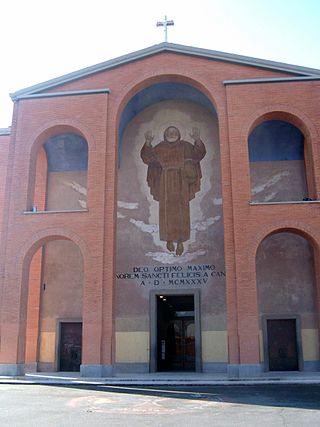
The Church of Saint Felix of Cantalice at Centocelle is a Roman Catholic titular church in Rome located in the Centocelle quarter, built as a parish church by decree of Cardinal Francesco Marchetti Selvaggiani, Vicar General of Rome.
The Society of the Faith of Jesus was a short-lived religious congregation of the Catholic Church whose members were known as Fathers of the Faith or Paccanarists, after the congregation's founder, Niccolò Paccanari.
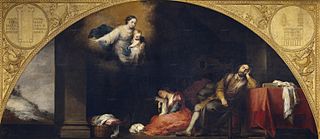
The Patrician's Dream or The Foundation of Santa Maria Maggiore in Rome I: The Dream of Patrician John is a 1665 oil on canvas painting by Bartolome Murillo. It has been in the Museo del Prado since 1901.
References
- ↑ Frank Leslie Cross; Elizabeth A. Livingstone, eds. (2005). The Oxford Dictionary of the Christian Church. Oxford University Press. p. 366. ISBN 978-0-19-280290-3.